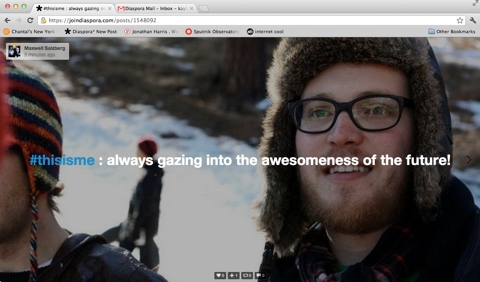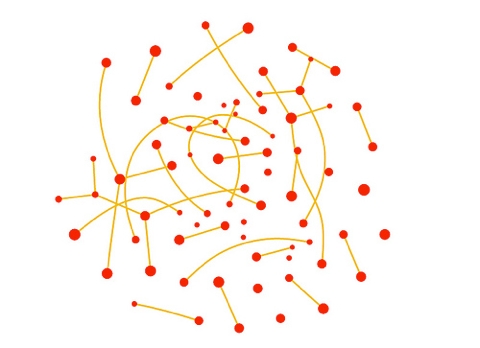Two years ago, four NYU students rode a wave of anti-Facebook sentiment and swelling Kickstarter hype to the tune of over $200,000 to build Diaspora, an open source social networking platform. Monday’s announcement that the founders are handing the project over to the open source community may kickstart development of a robust federated social networking platform to a greater degree than Diaspora has managed so far. Alternately, the move may consign the project to the dubious annals of crowdfunding cautionary tales.
In a way, Diaspora’s story reflects the youth of its creators: unbounded optimism and grand promises gave way to disappointment, backlash, and even personal tragedy. Once Diaspora’s Kickstarter campaign earned 20 times their goal, the developers were under extreme pressure to execute. Code releases were delayed, messaging and communication was muddled. Within a year, the negative sentiment that Diaspora marshaled during its funding campaign seemed to have been redirected towards the project itself.

Amid the hype that surrounded Diaspora’s campaign, a sentiment of skepticism began to emerge. During the height of the campaign, prominent voices such as Clay Shirky amplified doubts that Diaspora would meet its ambitious goal of releasing an alpha by the end of the summer. The project’s private alpha release came in November 2010 and received cautious optimism among funders and the tech press, but its delay and limited functionality bolstered the doubters’ arguments. By May 2011, high-profile tech blogs such as TechCrunch considered it old news, and a “Diaspora is vaporware” meme took hold.
Confirming the suspicions of the doubters, the founders announced in July 2011 that a year after they had raised 20 times their goal, Diaspora was $238 in debt (PDF). In October 2011, the founders tried to stem the growing backlash with a blog post titled “Diaspora: Not vaporware, not a Nigerian prince". Tragically, this was soon followed by the November 2011 suicide of co-founder Ilya Zhitomirskiy. By April of this year, the Diaspora blog obliquely stated ”You might notice some things starting to change around Diaspora”, and shared screenshots from a “hashtag campaign” that bears a striking resemblance to the founders’ recently-announced startup makr.io.

Since Diaspora’s goal was always to become an open source project, it’s premature to read Monday’s announcement as an outright failure. But in light of the founders’ immediate shift in focus to Makr.io, a meme generator and sharing site funded by über-incubator Y Combinator, the move reads less like a gift to the community and more like a flag of surrender.

So what’s the future of Diaspora look like? In an interview with BetaBeat, cofounder Max Salzberg stated “lots of open source projects are community run,” citing Mozilla and WordPress as two examples. While it’s true that both Mozilla and WordPress rely on large communities of contributors, Salzberg’s comparison doesn’t quite fit: both projects have been shepherded by monetized entities, whether that cash is coming through kickbacks from Google or premium enterprise services.
To consider what the future of Diaspora will be, it’s worth considering a recent project inspired by similar user ill-will. The social media platform currently inspiring geek ire is Twitter, which is steadily tightening the screws on the platform’s developer ecosystem by limiting access to Twitter’s API’s, and articulating a vision for the service’s future that looks a lot more like Facebook than a stream of 140-character plain text missives.
This prompted the recent successful funding of app.net, an alternative service pitched to the disenfranchised tech elite in a very different way. Rather than building an open and federated platform, as the students behind Diaspora aimed to do, app.net is instead developing a centralized social platform supported by user subscriptions rather than advertisers. It reached its campaign goal of $500,000 through $50 membership signups, thanks in no small part to the tacit endorsement of the high-profile bloggers and developers who have been among Twitter’s most vocal critics in recent weeks.
Who is Diaspora for?

Via Ruslan Enikeev's interactice visualization The Internet Map.
Despite the fundamental differences between Diaspora and app.net, they share the same basic problem: achieving the network effect. The success of a social network depends on a number of factors: early adopters who double as true believers, buzz, a new solution to an existing problem, or if nothing else, novelty.
At this point, does Diaspora boast any of these? The buzz has long worn off. And as Google has found with Plus, “people annoyed by Facebook” is not a sufficiently large enough group to build a robust and lively social network necessary to justify users’ time investment.
Pitching a new social service to the disenfranchised geekerati seems to be a safe bet when launching a new project, whether it’s open source or a startup. But there’s a perverse corollary to the adoption curve: while geeks are often the early adopters, the continued growth and value of any general-interest social media platform relies upon it being embraced by the masses.
Let’s say that Diaspora is for those unfazed by Git commits or spinning up a Heroku instance, who are wary of trading privacy to advertising companies for a web service. Even if that’s the case, what social networking benefits will it offer that aren’t already met by Slashdot, Github, or Stack Overflow? And though the social features of those services are limited, there are already many well-established open source social networking platforms that offer more functionality: Drupal, Elgg, Buddypress, Pligg, Mahara, to name a few.
The Potential of Federation

Image by scloopy on Flickr.
Diaspora’s last card to play may be its federated architecture. In an age of centralized, ad-supported services such as Facebook, Twitter, and Google, there is definite appeal to a social platform that runs on a decentralized architecture.
Such an approach becomes more compelling when you consider the ease with which the U.S. government has shut down allegedly infringing sites in recent years, and can easily access the user data of activists on social media, as Shareable’s own Malcolm Harris has found during a prolonged court case over his Twitter activity. In theory, nodes for a federated social platform that form a p2p network could be spun up in a closet or a garage, and taken offline just as easily, with little impact on the network.
But then we get back to the problem of network effects: the value of Twitter to the Occupy Movement was not merely one of communication and organizing, but also broadcasting. Those on the ground were capable of broadcasting instances of police violence in real-time not only to other Occupiers on some shared, niche social network, but to the entire world.

Occupy photo by David Shankbone via Flickr.
Federated social networks already exist, such as StatusNet, which powers the largely-forgotten Twitter rival identi.ca. But even with full knowledge of the privacy risks of using Twitter and Facebook, for the most part, tech-savvy Occupiers weren’t broadcasting to the handful of geeks who still post Drupal tips to identi.ca. They instead went where the widest and most diverse distribution of users would see their posts: Twitter, Facebook, and YouTube.
None of this is to say that a federated solution can’t work — only that the challenges are great. Now that Diaspora has been handed over to the community, it’s too early to declare it dead. As the founders noted in their announcement, Diaspora’s Github repository is active, as is its Pivotal Tracker project.
I remain cautiously optimistic that the open source community can create something great out of the code the founders released into the wild. Perhaps the existing code will be forked and become the basis for a new project that lacks Diaspora’s baggage. But no matter the outcome, its troubled development will stand as a crowdfunding cautionary tale about the dangers of promising much more than you can deliver.









